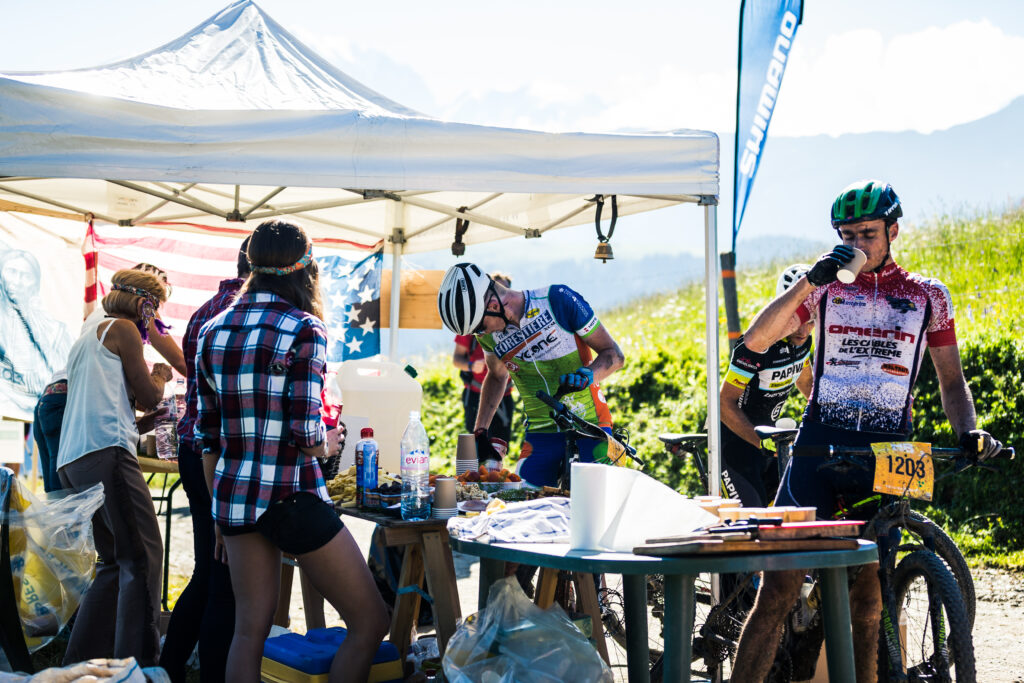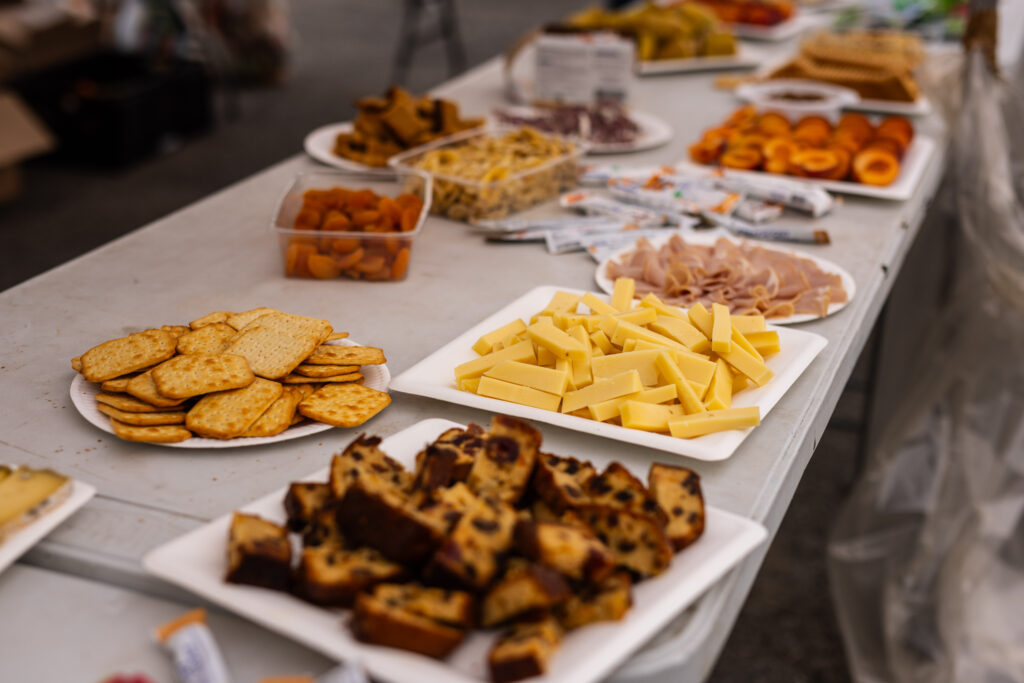July 3 to 5, 2026
Nutrition is an essential part of your preparation. If you want to perform, make sure you don’t neglect it!
For an endurance event like the MB Race, and with a view to performance, your nutritional strategy is paramount! If you don’t get it right, you could end up under-performing.
A good diet prior to the race will ensure that you arrive “recharged” and ready to give it your all! What’s more, a diet optimized for the race will be ideal for maintaining energy levels as long as possible during the race. The aim is not to lose too much intensity and lucidity.
Maxence Poulain, dietician-nutritionist specializing in sports nutrition and micronutrition, gives you his advice for an optimized nutritional strategy before and during the race!
A race like the MB Race can require a prolonged effort (up to ten hours for the best and even longer). A well-established nutritional strategy will help you prepare for the race, optimize your endurance and reduce the risk of injury. This requires a balanced, strategic daily diet over several weeks.
Adapting your meals will be important for maximizing your health, and in this way, boosting your performance in training and being ready on competition day.
This preparation phase must go hand in hand with a diet that meets your energy requirements (the most important thing is to listen to your body and respond to your hunger). Of course, this means providing the right nutrients (proteins, lipids, carbohydrates) and micronutrients (vitamins and minerals) in sufficient quantities.
Nutrition during this period aims to :
A common mistake is to underestimate this phase, thinking that “eating well the day before” is enough. But energy reserves and muscular adaptations are built up over time.
Above all, it’s very important to maintain a balanced diet and a healthy lifestyle in general. A simple benchmark to have if you are a regular sportsman, is to build your plate in the following way:
Pair this with a piece of fruit for dessert and you’ve got a top-notch meal!
As you’ll see from this article, carbohydrates are your cells’ preferred source of energy, so you need to pay special attention to them!
For the more assiduous, here are the quantitative recommendations to follow for an adequate intake of nutrients and micronutrients:
In terms of daily energy intake according to size and training load, this would give the following estimate:
A 60 kg cyclist may need 2,400 kcal on off-duty days and up to 4,800 kcal on busy days! That’s twice as much! But don’t be fooled by these values, as they’re just ranges to illustrate what they might represent.
Let’s get away from the numbers and get back to basics. Of course, you have to enjoy your diet! And when we say pleasure, we mean possible “deviations”, so don’t feel guilty! A “pleasure” food or meal can be included in this nutritional plan. Eating must remain pleasant and convivial!
However, the closer you get to the event, the more important a healthy lifestyle becomes. Varied, balanced meals and limited or no alcohol consumption are therefore more than welcome.
You should also adapt the quantity of your meals to the training sessions you plan, in order to promote recovery and avoid the risk of injury. And don’t neglect your hydration: a hydrated body performs better during training, recovers better and is less prone to injury.
Here are some examples of typical meals (breakfast, lunch and dinner) for a balanced daily diet.
Day off | Training day | Breakfast: 2-3 hard-boiled or fried eggs At least 1 piece of fruit (preferably seasonal and local) 3 slices of more or less wholemeal sourdough bread. (long fermentation) or gluten-free ideally Yogurt or fromage blanc from sheep/goat 1 handful of oilseeds (walnuts, hazelnuts, almonds) or 1 tablespoon of oilseed purée +/- 1 square of chocolate (dark chocolate min. 70% cocoa) | Breakfast:
2-3 hard-boiled or fried eggs
Muesli or oat porridge possible (30 to 50g depending on hunger)
At least 1 piece of fruit (preferably seasonal and local)
3 slices of sourdough bread, more or less wholemeal (long fermentation) or gluten-free, ideally Yogurt or fromage blanc from sheep/goat milk 1 handful of oilseeds (walnuts, hazelnuts, almonds) or 1 tablespoon of oilseed purée +/- Bread if you’re hungry. +/- 1 square of chocolate (dark chocolate min. 70% cocoa) |
|---|---|
Snack (depending on hunger): 1 handful of oilseeds (hazelnuts, almonds, etc.) 1 fresh or dried fruit (dates, grapes, figs, apricots, etc.) | |
Breakfast: Vegetables (as many as you like): 1 raw and 1 cooked (otherwise at least 1 raw fruit) A variety of interesting oils Protein: 100 to 150g (increase if fewer starches) White/semi-complete starches (ideally gluten-free) ≈ 60 to 90g raw Possibility of a piece of cheese (≈ 30g: Favor ripened cheese. 1 piece of fresh fruit or compote with no added sugar +/- 1 square of chocolate (dark chocolate min. 70% cocoa) | Breakfast: Vegetables (as many as you like): 1 raw and 1 cooked (otherwise at least 1 raw fruit) A variety of interesting oils Protein: 100 to 150g (increase if less starchy foods) White/semi-complete starches (ideally gluten-free) ≈ 70 to 100g raw Possibility of a piece of cheese (≈ 30g: Favor ripened cheese. 1 piece of fresh fruit or compote with no added sugar +/- 1 square of chocolate (dark chocolate min. 70% cocoa) |
Snack (depending on hunger): 1 handful of oilseeds (hazelnuts, almonds, etc.) 1 fresh or dried fruit (dates, grapes, figs, apricots, etc.) | Snack : Cereal bar or mini sandwich 1 piece of fresh fruit or 1 yoghurt |
Dinner: Same as lunch but VEGETARIAN (e.g. eggs), or even VEGETALIAN (legumes, tofu, tempeh). | Dinner: Same as lunch but VEGETARIAN (e.g. eggs), or even VEGETALIAN (legumes, tofu, tempeh). |
*The amount of starch varies according to your appetite, and is the thing you change most according to your training phases. Remember: starches = fuel for the body. So vary your tastes!
If you’re lacking inspiration for your meals, Wild Side Canteen is here to help with a range of healthy, balanced recipes. You can find them below.
When you train, make sure you also train your digestive system for exertion (stomach and gut-training). Test all the products you’re going to eat during the race (bars, gels, energy drinks, homemade snacks, etc.). The aim is to avoid “surprising” your stomach and intestines on D-day, at the risk of a few digestive surprises… The idea is to get your body into race condition, so you can be sure you’re assimilating the food you eat. Especially as on D-Day, there could be an additional stress factor, which could encourage digestive problems.
Training is also a good time to regulate your hydration. Ideally, you should be drinking 500 to 800mL (in hot weather) per hour of exercise, depending on your tolerance. Once you’ve decided on your usual training intake, you can repeat this on race day!
Training for 5 to 10 weeks allows you to adapt to a new habit! It’s up to you!


In the last month before the race, you need to maintain the balanced diet you’ve built up during your months of preparation, but you also need to pay even more attention to your alcohol intake and sleep to help you recover. That’s when you need to be at your best!
During this month, and particularly on rest days, the aim will be to optimize your recovery, since you’ll still be doing some training. With this in mind, always remember when planning your meals:
*Think plant proteins if you want to reduce your meat intake! Vegetable proteins are just as interesting. They are mainly found in legumes (green, coral and blond lentils, split peas, chickpeas, kidney, black and white beans, soya beans, tofu, tempeh, etc.) and oilseeds (walnuts, almonds, hazelnuts, etc.).
If your evening meals are vegetarian or even vegan, your sleep and recovery will thank you!
Finally, it’s during the last week before the event that you’ll need to modify your consumption somewhat. From D-6 to D-4, you should stick to a normal carbohydrate diet, i.e. keep the same portion of starchy foods as usual.
3-4 days before the event (ideally D-4), you need to start carb loading to build up your glycogen stores. This is achieved by increasing the proportion of complex carbohydrates ingested during the day. Encourage an increase in starchy foods rather than sugary products rich in “fast” simple sugars (sweets, pastries, pastries, confectionery, etc.).
Roughly speaking, during this phase your plates will look more like this:
If we focus on quantitative carbohydrate recommendations, here’s what’s recommended for the last few days:
Over the last 3 days (including D-Day), the aim is to keep your reserves high by favouring easily digestible carbohydrates (white rice, white sourdough bread, potatoes, bananas, etc.) and in particular refined carbohydrates (not wholemeal), in order to limit the risk of digestive problems during the race.
During the 48 to 72 hours preceding the MB race, we recommend a “digestive sparing” diet. This is said to be low in residues and low in fermentable carbohydrates, in particular by reducing or, for the most sensitive, avoiding foods rich in FODMAPS (fermentable carbohydrates).
During this period, we should also avoid fiber (raw fruit and vegetables, legumes), cooked fats (cooking oils, fried foods), high-fat foods (full-fat dairy products, fatty meats and oilseeds), certain sources of animal protein that are harder to digest (red meat, fatty fish), and spices.
On the other hand, we prefer well-cooked, peeled vegetables and fruit in the form of soups, purées, compotes or juices, for example. Go for lean meats and fish (chicken, turkey, white fish, eggs…).
What’s more, splitting up your daily diet a little more will encourage this recharging. Going from 3 to 5 or even 6 meals a day will facilitate glycogen storage. With 2 to 3 snacks in addition to the usual meals. (morning, afternoon or even evening)
This is when you can consider using malto-dextrin to promote and optimize glycogen reserves. Malto-dextrin powder (a pre-cut complex carbohydrate) is often derived from corn or manioc, depending on the powder used, and will make storage easier and quicker, as it is easier to digest and absorb. This can be done during non-meal times, for example, as part of your snack.
Promoting a good state of hydration is also essential to maximizing your sporting performance. This is because glycogen storage in the liver and muscles requires a lot of water (3g of water for 1g of glycogen). So don’t worry if you drink more than usual and put on a little weight. This is perfectly normal and even beneficial. It’s linked to the intra- and extra-cellular water retention resulting from this storage.
And this year, we are offering you the chance to book your pre-race meal! Gregory Thouverey, who specialises in sports nutrition with his Wild Side Canteen organisation, has put together a menu specially designed and tailored to your MB Race goal, rich in carbohydrates, easy to digest and delicious! You can book your meal in your runner’s area!
Let’s start with breakfast! What’s the ideal breakfast and when should you eat it? In general, your last meal should be one that you like, that you’ve already tested beforehand and that offers a good compromise between energy and digestive comfort.
Ideally, it should be taken 3 to 4 hours before the race, but in the end, you shouldn’t focus too much on it, as it’s not the meal that has the greatest impact on performance, it simply keeps the body nourished so as not to deplete your glycogen stores. The key is to choose easily digestible products that won’t upset your digestive system.
Here’s an example of a typical breakfast:
In the 2 hours before the race, you can also set up a hydration strategy before the start: 500mL of mineral water with 1g of salt added. You can also add a “waiting” drink (for a 500mL flask with around 30g of carbohydrates), for a total of 1L.
Here’s a homemade example:
Now it’s time to race! Please note that everything described here is, of course, theoretical. Even if you build an optimal nutrition plan, you must be aware that the vagaries of the race can call it into question. The important thing is to be adaptable, even if you’ve anticipated everything.
If the start is early in the morning and you want to give priority to your sleep, a waiting ration will suffice until the start (if the last meal of the previous day was adequate). The key is to get your energy intake right from the start and throughout the race. Don’t wait until 1 hour into the race to start refueling.
In addition to the glycogen replenishment already carried out, the challenge during the effort, and particularly for the longest events, will now be to save these muscular stocks by limiting their depletion through the regular ingestion of so-called “exogenous” carbohydrates, thanks to your external intake eaten on the bike.
The quantity of carbohydrates consumed during your effort will depend on the duration (the greater the distance, the greater the need), the environmental conditions to be taken into account (see following article), the difficulty of the event (the more intense, the greater the need for carbohydrates), the possibility of refuelling and finally your digestive tolerance (worked on during training).
Here are the quantitative recommendations for carbohydrates per hour of exercise:
!!! This should be taken into account if digestive training has been carried out beforehand (especially above 60g/h)!!!!
High doses are not recommended if you’re not trained or accustomed to taking them (stick to 30-40g/h if you are!) This will avoid possible setbacks.
In addition, favour liquid and semi-liquid forms (energy drinks, gels, compotes, fruit juices, etc.) to facilitate intestinal absorption if you want to avoid discomfort on the bike as much as possible. Finally, if you’re aiming for high intakes (60g/h or more), choose commercial products with a glucose/fructose ratio = 2:1 or 1:0.8. This will improve the utilization of these carbohydrates by your muscle cells to produce energy.
How often should I eat?
At the start of the race, you mustn’t neglect your diet, as the exertion causes digestive ischemia (poorly irrigated digestive tract). This is exacerbated by potential stress. In fact, your digestive mucosa will be less irrigated than usual, as the blood is taken up by your muscles. To begin with, you need to choose foods that are easy to digest. For example, sweet, “soft” foods such as fruit pastes or semi-liquids like gels or compotes are easier to digest and therefore preferable at the start of a race.
For the second part of the race, you can vary and start with more complex foods such as energy bars, dried fruit, cookies, fruit cakes, gingerbread, rice cakes or homemade energy balls… because your body will be a little more used to digestion during exercise. The alternation of sweet and savoury foods should not come too early. But if your sweet tooth is waning and you’re craving something salty as the race progresses, go for it! It varies the pleasures!
Your body may ask for “solid” food after about 2 hours. Before that, you can compensate with an exercise drink. But don’t wait until you feel hungry! You need to eat regularly. It may be worth setting a reminder to eat every 30 to 45 minutes minimum. When you eat, remember to chew well. Chewing is very important in the digestion process. Feel free to take only half bars if necessary and foods that melt in your mouth (e.g., fruit pastes). Drink a sip of water after eating to help with ingestion.
Hydration is once again essential during the race! As you know, hydration plays a vital role in sports performance. Indeed, the idea is not to exceed 2% dehydration to avoid any risk or loss of performance. It has been shown that 2% dehydration reduces aerobic and cognitive capacity by 20%! This means greater fatigue during exercise, reduced attention span and a greater risk of falls/injury. So make sure you drink regularly over a long run, 2-3 sips every 15 minutes, alternating between a water bottle and a sports drink. The effort drink will meet your energy needs and help your body absorb water, while the water alone will boost your hydration and help you cut the “mushy” effect after ingesting food.
Be careful with the dosage of the exercise drink. A sports drink should be more or less concentrated, depending not only on the outside temperature, but also on your body. Once again, this dosage should be tested during your training sessions.
Before elaborating on this aspect, it’s worth noting that at altitude, energy requirements are basically higher.
In cold / rainy weather at altitude :
Cold requires more energy from the body to maintain body temperature. The sensation of thirst diminishes, but water losses (breathing, perspiration) persist. The solutions are as follows:
In hot weather / high sun exposure at altitude:
Heat is the main enemy during endurance efforts. Sweating increases, and with it sodium, magnesium and potassium losses. And hypoglycemia can occur more quickly (= low blood sugar levels). The solutions are as follows:
When refuelling, at the start of the race (up to 6 hours, depending on digestive saturation with carbohydrates and sugary products), certain foods such as gels, bars and sports drinks from our partner Overstim·s (we recommend training with these same products beforehand). Conversely, avoid certain other foods such as cheese, almonds, bacon or sausage, which are very fatty and will impair digestion. And could potentially affect your performance.
On the other hand, over 6 hours of running is ultra-endurance, and if you can’t manage to ingest 90g of carbohydrates per hour as recommended in the strategy, and you’re craving fattier foods (which is normal), you’d be better off with oilseeds such as almonds and walnuts, or even a good tomme or Savoy cheese! These foods complement the 30 to 50g of carbohydrates per hour.
For this type of ultra-endurance effort, the recommended caloric intake is around 200kcal/h (more is possible, but the risk of dropping out is greater).
Above all, don’t test a product you haven’t tried beforehand in training. And in general, avoid eating foods you’re not used to consuming during exercise.
All these recommendations can help you manage your diet and hydration during the race. That said, you should always be prepared for the vagaries of stress and fatigue. That’s why it’s important to follow your desires, even if it means breaking your plan. Indeed, once you’ve reached a certain stage in the race, it’s the mental side of things that will surely take over, and if you’re drawn to food that’s likely to boost your morale, like the sausages from Plateau de la Croix, go for it! (especially if it’s the end of the race and you can’t help yourself). The body is programmed (in a situation of energy shortage) to seek out calorie-dense foods, it’s a survival reflex. So don’t feel guilty about eating something you enjoy. Just enjoy it! It will provide you with more proteins and lipids, and that can only be good for you!


With health and/or performance in mind. Nothing is left to chance. A diet adapted to your profile and needs is key! Long-term nutritional monitoring, whether for weight maintenance, weight gain or loss, or simply to prepare for an event such as the MB race, can be of enormous benefit to you!
Every athlete is unique. Weight, height, digestive tolerance, schedule, life experience, sports training, all influence the nutritional strategy.
An individualized follow-up allows you to :
As a sports dietician, I can help you build a tailor-made nutritional and hydration strategy, based on your physiognomy, your effort and the weather forecast. This can be based on simple foods or specific products. Together, we can avoid fatigue, recovery problems, digestive disorders, heat or cold exhaustion, hypoglycemia, poor performance or even dropping out.
My role is to support you through every phase, with practical tools and advice, tailored meals, and real follow-up aligned with your goals. This guidance covers the entire nutritional spectrum (daily nutrition, competition prep, gut training, nutritional periodization, supplements, etc.).
Here is a more detailed overview of the services I offer for personalized support:
Sports Nutritionist and Dietitian specializing in Sports Nutrition and Micronutrition
Tel : 06 04 40 70 11
Mail : dietomaxnutrition@gmail.com
LinkedIn : https://www.linkedin.com/in/maxence-poulain-130b3521b/
Instagram : dietomax.nutrition